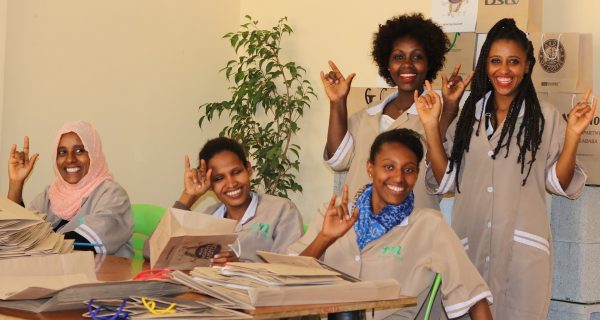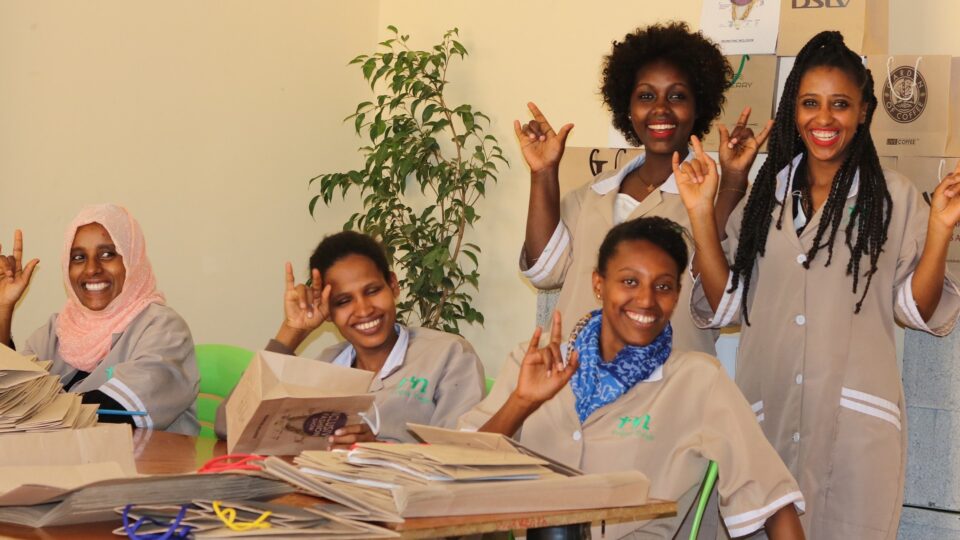In the largest city of Ethiopia, a small social enterprise is working towards wiping the country clean of plastic bags, whilst empowering the deaf community. Teki Paper Bags employs deaf women to make and sell paper bags using Ethiopian sign language. Its employees visually educate clients about plastic pollution and offer sustainable alternatives to single-use plastic bags, in the hope to build a plastic-free Ethiopia.
The plastic problem is global. “It’s dramatic, like in many other countries,” says Clement Piguet, co-founder of Teki Paper Bags, when asked how bad plastic pollution is in Ethiopia. Around the world, single-use plastic bags are sitting in landfill as deadly waste and in the Ethiopian capital of Addis Ababa, the abundance of plastic bags is responsible for river contamination and sewage system blockage – which in the past has caused flooding in the city. “Why are we accepting all these plastic bags without saying anything? Why are we not listening, not paying attention? Maybe it’s time to rethink the solutions we propose,” adds Clement.
Teki Paper Bags was built with single-use plastic solutions at the forefront of the business and its unique selling approach has persuaded people to pay attention and listen. Co-founders Clement Piguet and Mimi Legesse, share the dream of turning the global fight against plastic bags into a universal inclusion concept, dedicated to uplifting the deaf community.
The word, Teki [ተኪ], is an Amharic word that comes from the verb ‘Metekat’ – which means ‘replacing’. Since 2016, when the social enterprise was first established, the Teki Paper Bag team has replaced more than one million plastic bags in Ethiopia. It’s quite the achievement, but it hasn’t been easy.
“The beginning of our journey was challenging, as many refused to support us,” says Clement. ‘Thanks for coming, but your idea is way too complicated to implement. How are you going to use sign language to sell your products? It won’t work!’, was a common response to the idea of Teki Paper Bags.

Despite the lack of external support, Mimi, who understood the obstacles deaf people faced, and Clement, who wanted to give deaf people opportunities and employment, built the first deaf-run paper bag business in the world. “When you believe in yourself, don’t let anyone stop you. We decided to create Teki Paper Bags in Ethiopia, on our own without any external support,” says Clement.
Pulling plastic bags from the streets of Ethiopia was just one objective of the business. Teki was also created with the intention of positively changing and improving the lives of the deaf community. It’s achieving this by offering deaf women in Ethiopia permanent employment, which is difficult to find, and social situations, to improve low mental and social health that many deaf people experience.
“For the deaf community worldwide, finding a job is a nightmare. It doesn’t matter what the task or the responsibility is, they are always ‘unadapted’, mainly due to a profound communication gap,” says Clement. “Therefore, unlike other disabilities that can find an adapted space in an already existing structure, we must support the deaf community to create dedicated structures that are designed and organised to function in sign language.”
The structure that Mimi and Clement have created for Teki Paper Bag employees has not only provided deaf women in Ethiopia an opportunity to have an occupation and earn a wage. It’s also significantly improved their mental and social health, through the chance to socialise with other deaf people who can understand and communicate.
“The deaf community mainly suffer from their inability to communicate and be understood. This constant communication gap creates a silent, social exclusion that leads many into depression,” Clement tells me. “More than half of the Teki family used to only meet their deaf friends once a week, at church for one hour. This can’t be enough to maintain safe mental health. The Teki family now sign and communicate daily and have made many friends, which has increased self-confidence.”
Mimi and Clement started Teki Paper Bags with just three employees. The social enterprise today has grown significantly to create 25 jobs and employ 18 deaf workers – who all communicate using sign language and have grown as individuals and employees.

Despite significantly reducing the amount of plastic bags in Addis Ababa, it’s the family spirit that is nestled into the building of Teki Paper Bags, that remains Clement’s biggest achievement so far.
“Being deaf in Ethiopia is a constant challenge for these young ladies. Seeing everyone’s daily progress and their ability to work together and overcome obstacles in sign language is a blessing. Mimi and the team are doing an incredible job; they truly deserve the world’s attention,” Clement adds.
Teki’s employees handcraft 100% biodegradable paper bags with social and environmental impact, using recycled paper – the perfect replacement to the single-use plastic bags clogging up the streets of Addis Ababa. Businesses in Ethiopia can customise their eco-friendly bags in terms of size and weight to suit the products they sell, and promote their business by adding their logo.
So far, Teki Paper Bags have created sustainable paper bags for over 150 businesses, including big names like Marriott, Radisson Blu, Gusto and DStv. “What’s important is how many businesses stay with us and become part of the Teki family. The fight against single-use plastic isn’t a sprint, it’s a long-distance run, which is one of Ethiopia’s speciality, isn’t it?” says Clement.
The deaf employees of Teki Paper Bags sell the paper bags themselves using Ethiopian sign language, with the support of sign language interpreters. “Convincing people to stop using plastic bags in Ethiopian sign language is like magic – it works!” Smiles Clement.
Through communicating with sign language, employees can raise awareness about plastic pollution from a different perspective and stress the importance of switching from single-use plastic bags to biodegradable paper bags. Using sign language has been a successful way to encourage the people of Ethiopia to be part of the solution, not the pollution.
“Using our hands and signing contains a universal aspect that fascinated us all. Once Mimi and our employees start signing and it was translated by our interpreter, people lent their attention. Many of us have never had the chance to have a conversation with a deaf person, this opportunity creates a unique connection between our team and our clients,” Clement continues.
Yet they’re aware that the plastic problem can’t be solved by the single action of selling paper bags. To ensure there was enough work to continue employing deaf people, the team at Teki Paper Bags has developed The Teki Movement.
The Teki Movement is a two-step plan designed to reach a wider audience and appeal for more help in the fight against single-use plastic. The first step focuses on selling paper bags to big businesses willing to support Teki Paper Bags and what it stands for.
The second step focuses on distributing free paper bags to small businesses owned by women. “The free paper bags we distribute help women entrepreneurs to make extra savings from not buying plastic bags,” says Clement. Teki has already distributed more than 200,000 free paper bags to entrepreneurs, who’re now actively participating in the fight against plastic pollution.

“We believe in an inclusive change where everyone is involved – only selling our paper bags wouldn’t be enough to efficiently fight plastic bags”, says Clement. “The friendships that the entrepreneurs have built with our team is unique. They are now among the best ambassadors in our fight against plastic, and have started to learn sign language – how beautiful is that?”
Teki’s dreams are big. In four short years, it has provided 18 deaf women, in Ethiopia, with the opportunity to work and communicate, build friendships and good health. It’s made a significant impact in the fight against plastic and encouraged hundreds of Ethiopian businesses to become greener. But, for Clement, so much more needs to be done to accomplish the Teki Paper Bag dream.
“Just take a second and imagine thousands of deaf women uniting across Africa to fight against plastic bags in sign language. How powerful and convincing they would be,” says Clement. “To turn Ethiopia into a plastic bag free nation, while creating hundreds of rewarding and adapted jobs for the ones who need it most.”

